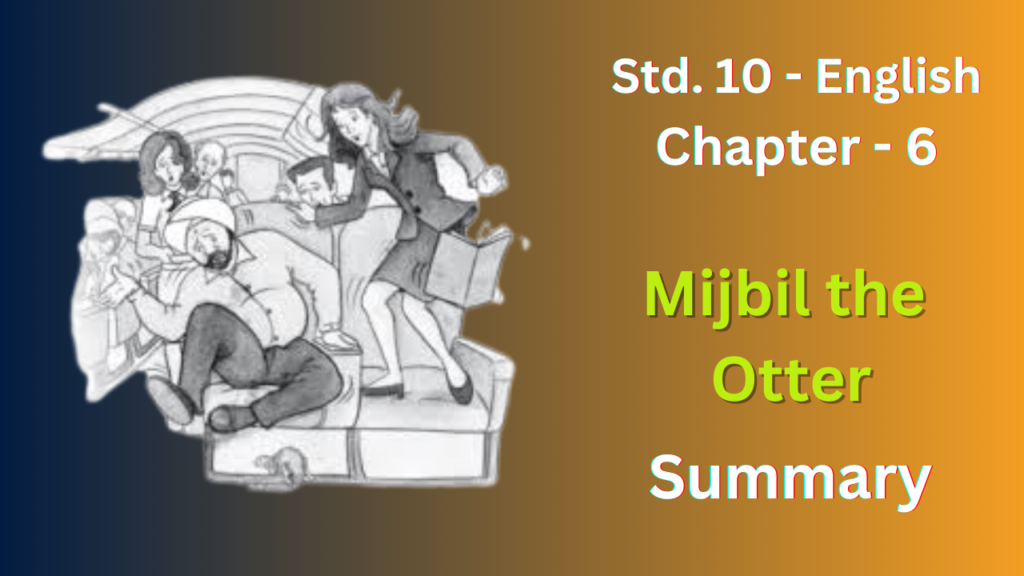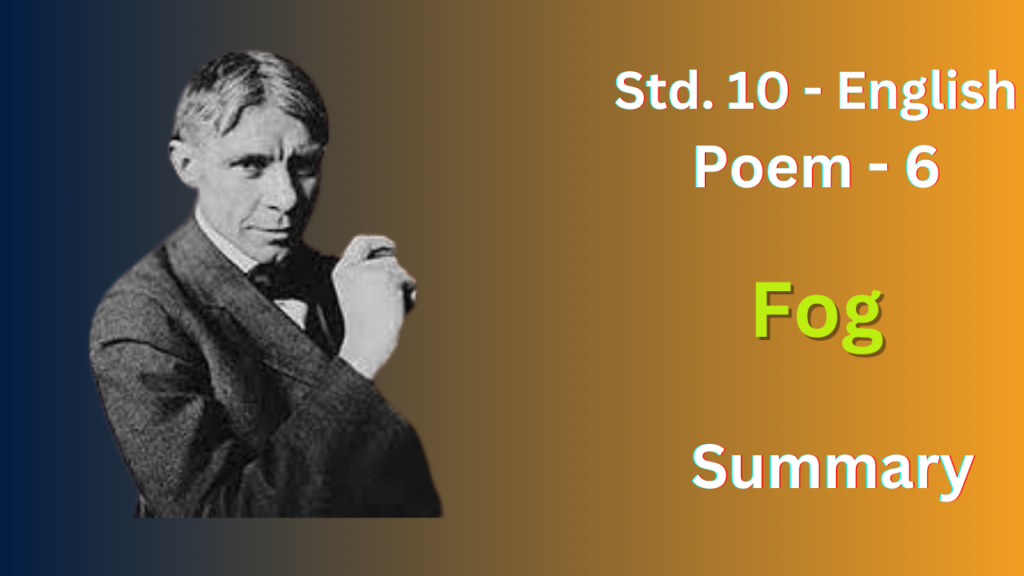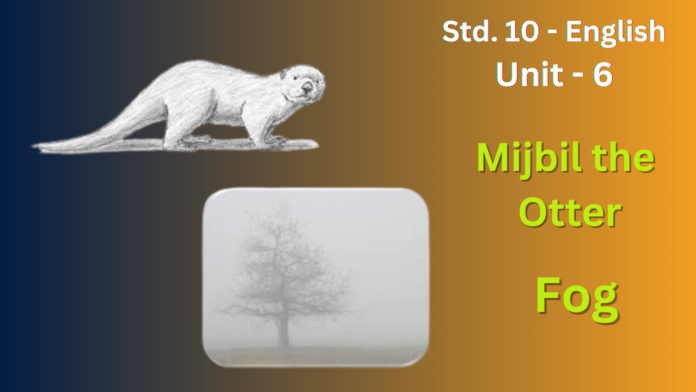Mijbil the Otter
NCERT Solutions for Class 10 English Chapter 6
Here’s a summary of the chapter “Mijbil the Otter” from your 10th standard English subject:
Setting and Characters:
- The story takes place in Iraq, primarily in the city of Basra, and later during a flight to London.
- The narrator, Gavin Maxwell, is a writer who decides to keep an otter named Mijbil (or Mij) as a pet.
Plot:
- After losing his pet dog, the narrator feels lonely and seeks a new companion. He learns about otters found in the Marshes along the Tigris River.
- In Basra, he acquires Mijbil, who quickly becomes a source of amusement and chaos. Mijbil enjoys playing with water, opens the faucet himself, and loves marbles and rubber balls.
- As the narrator needs to return to England, he faces challenges due to airlines not allowing pets. He eventually manages to book Mijbil on a flight by putting him in a box and claiming ignorance about the animal inside.
- During the flight, Mijbil creates havoc by escaping from his box and causing a commotion. A kind air hostess helps the narrator calm Mijbil down.
Themes:
- Human-animal bond: The story explores the unique and playful relationship between the narrator and Mijbil.
- Challenges of keeping exotic pets: Owning an otter proves to be difficult and requires adjustments to accommodate its natural behaviors.
- Importance of understanding animal needs: The narrator learns about the challenges of keeping an otter as a pet and the importance of considering their natural habitat.

NCERT Solutions for Class 10 English Chapter 6 :Mijbil the Otter
Oral Comprehension Check
1. What ‘experiment’ did Maxwell think Camusfearna would be suitable for?
Ans : The experiment Maxwell thought Camusfearna would be suitable for was keeping an otter as a pet.
The passage describes Maxwell’s search for a new companion after his dog’s death. He learns about otters and decides to acquire one, believing the location of Camusfearna, close to water, would be an ideal environment for this “experiment.”
2. Why does he go to Basra? How long does he wait there, and why?
Ans :
The text mentions he, along with his friend, initially went to the Consulate-General in Basra to collect and respond to mail from Europe.
This unexpected delay forced him to wait in Basra for a reported five days until his mail finally arrived.
3. How does he get the otter? Does he like it? Pick out the words that tell you this.
Ans : In Basra, while waiting for his mail, Maxwell receives an otter as a gift from his friend .The text doesn’t explicitly say he loves it, but the story continues with their adventures, suggesting at least some tolerance for his unusual pet.
4. Why was the otter named ‘Maxwell’s otter’?
Ans : Zoologists named the otter Lutrogale perspicillata maxwelli, which is why it is commonly referred to as Maxwell’s otter.
5. Tick the right answer. In the beginning, the otter was
1. aloof and indifferent
2. friendly
3. hostile
Ans : hostile
6. What happened when Maxwell took Mijbil to the bathroom? What did it do two days after that?
Ans : When the author first took Mijbil to the bathroom, the otter went wild with joy in the water. He plunged and rolled around, jumping up and down the length of the bathtub, making a lot of sloshing and splashing. After two days, the otter suddenly disappeared, only to be found in the bathroom playing in the water, having turned on the tap by himself.
Oral Comprehension Check
1. How was Mijbil transported to England?
Ans : Mijbil was packed in a box as per the airline’s instructions. Since British airlines did not permit pets on board, the author had to book a ticket with a different airline for the journey from Iraq to Paris and then from Paris to London.
2. What did Mij do to the box?
Ans : The box was lined with a metal sheet. Mijbil didn’t feel comfortable inside and attempted to escape. In his effort to break free, Mijbil tore through the metal lining of the box, injuring himself in the process.
3. Why did Maxwell put the otter back in the box? How do you think he felt when he did this?
Ans : With no alternative way to transport Mijbil to London, Maxwell placed him back in the box. Maxwell must have felt pity for the otter, seeing how he had hurt himself. Additionally, he must have been concerned about Mijbil’s well-being.
4. Why does Maxwell say the airhostess was “the very queen of her kind”?
Ans : The airhostess showed great sympathy after hearing Maxwell’s story. She understood his situation and granted him permission to take the otter out of the box. Because of her kindness and understanding, Maxwell referred to her as “the very queen of her kind.”
5. What happened when the box was opened?
Ans : As soon as the box was opened, Mijbil ran out and darted around, causing chaos and frightening the passengers. His sudden appearance unsettled most of the people on the plane.
Oral Comprehension Check
1. What game had Mij invented?
Ans : Mijbil invented a unique game involving a ball. One of the author’s suitcases was damaged, sloping on the top part. Mijbil would place the ball on the higher end and then dash to catch it as it slid down to the lower end.
2. What are ‘compulsive habits’? What does Maxwell say are the compulsive habits of
1. school children
2. Mij?
Ans : Compulsive habits are actions that a person feels driven or compelled to repeat, often despite knowing they are irrational or unproductive.
1. According to this story, children must place their feet squarely in the center of each paving block, touch every seventh upright of the iron railings, and pass on the outside of every second lamp post.
2. On its way home, Mijbil would leap over the boundary wall railing and sprint along its entire length.
3. What group of animals do otters belong to?
Ans : Otters belong to a group of animals called Mustelidae. This is a family of carnivorous mammals that includes:
- Badgers
- Weasels
- Stoats
- Minks
- Wolverines
- Skunks
- Ferrets
4. What guesses did the Londoners make about what Mij was?
Ans : The Londoners, unfamiliar with otters, made a variety of wild guesses about Mijbil’s identity.
- Baby seal
- Squirrel
- Walrus
- Hippo
- Beaver
- Bear cub
- Leopard
- Brontosaurus
Thinking about the Text
1. What things does Mij do which tell you that he is an intelligent, friendly and fun-loving animal who needs love?
Ans : Mijbil invented his own game using a ping-pong ball and an old suitcase. He loved water, and once he realized that turning on the tap made water come out, he would get into the tub and play with it. Over time, Mijbil formed a special bond with Maxwell. He became desperate when Maxwell left him in a box, wanting to come out as soon as possible.
2. What are some of the things we come to know about otters from this text?
Ans : Otters belong to a relatively small group of animals known as Mustelids, which also includes badgers, mongooses, weasels, stoats, minks, and others. They are commonly found in large numbers in marshes. Arabs often keep and tame them as pets. Otters love to splash and play in the water. Maxwell’s otter belonged to a species previously unknown to science and was eventually named Lutrogale perspicillata maxwelli by zoologists.
3.Why is Mij’s species now known to the world as Maxwell’s otter?
Ans : Maxwell’s otter belonged to a species previously unknown to science and was eventually named Lutrogale perspicillata maxwelli by zoologists. As a result, it is commonly referred to as Maxwell’s otter.
4. Maxwell in the story speaks for the otter, Mij. He tells us what the otter feels and thinks on different occasions. Given below are some things the otter does. Complete the column on the right to say what Maxwell says about what Mij feels and thinks.
| What Mij Does | How Mij Feels or Thinks |
| Plunges, rolls in the water and makes the water splosh and splash | |
| Screws the tap in the wrong way | |
| Nuzzles Maxwell’s face and neck in the aeroplane |
Ans :
| What Mij Does | How Mij Feels or Thinks (what Maxwell might say) |
| Plunges, rolls in the water and makes the water splosh and splash | Mij is overjoyed (went wild with joy) and having a blast playing in the water. |
| Screws the tap in the wrong way | Mij is frustrated (irritated and disappointed) because he can’t turn the water on properly. |
| Nuzzles Maxwell’s face and neck in the aeroplane | Mij is scared (distressed) and seeking comfort from Maxwell in the unfamiliar airplane environment. |
5. Read the story and find the sentences where Maxwell describes his pet otter.
Then choose and arrange your sentences to illustrate those statements below that you think are true. Maxwell’s description
1. makes Mij seem almost human, like a small boy.
2. shows that he is often irritated with what Mij does.
3. shows that he is often surprised by what Mij does.
4. of Mij’s antics is comical.
5. shows that he observes the antics of Mij very carefully.
6. shows that he thinks Mij is a very ordinary otter.
7. shows that he thinks the otter is very unusual.
Ans :
1. True
2. False
3. True
4. True
5. True
6. False
7. True
Thinking about Language
Noun Modifiers
Look at these examples from the text, and say whether the modifiers (in italics) are nouns, proper nouns or adjective plus noun
1. An offer fixation
2. The iron railings
3. The Tigris marshes
4. The London streets
5. Soft velvet fur
6. A four- footed soccer player
Ans :
1. Noun
2. Noun
3. Proper noun
4. Proper noun
5. Adjective plus noun
6. Adjective plus noun
2. Given below are some nouns, and a set of modifiers (in the box). Combine the nouns and modifiers to make as many appropriate phrases as you can. (Hint: The nouns and modifiers are all from the texts in this book.)
temple girls triangle dresses person thoughts boys roar gifts scream farewell expression time subject landscape handkerchief crossing flight chatterbox profession physique coffee view celebration
college rough hundred stone ordinary love uncomfortable white slang slack bare railroad termendous family marriage plump invigorating panoramic heartbreaking birthday incorrigible ridiculous loud first three
Ans :
| 1. | Temple | Stone temple |
| 2. | Gifts | Ordinary gift, birthday gift. |
| 3. | Time | First time, family time, college time |
| 4. | Crossing | Railroad crossing |
| 5. | Physique | Plump physique, ordinary physique |
| 6. | Girls | Incorrigible girls, plump girls, college girls |
| 7. | Thoughts | Uncomfortable thoughts, ridiculous thoughts, ordinary thoughts, good thoughts, invigorating thoughts |
| 8. | Scream | Loud scream, heartbreaking scream |
| 9. | Subject | Uncomfortable subject |
| 10. | Flight- | First flight, ordinary flight, uncomfortable flight |
| 11. | Coffee | Black coffee, ordinary coffee |
| 12. | Farewell | Tremendous farewell, college farewell |
| 13. | Landscape | Rough landscape, |
| 14. | Chatterbox | Incorrigible chatterbox, ridiculous chatterbox |
| 15. | View | Panoramic view, ordinary view |
| 16. | Dresses | Ordinary dresses, birthday dresses, marriage dresses |
| 17. | Handkerchief | White handkerchief, clean handkerchief |
| 18. | Profession | Family profession |
| 19. | Celebration | Birthday celebration, tremendous celebration |
| 20. | Roar | Loud roar |
III. Read the Sentences:
1. Match the words on the left with a word on the right. Some words on the left can go with more than one word on the right.
1. A portion of — blood
2. A pool of — cotton
3. Flakes of — stones
4. A huge heap of — gold
5. A gust of — fried fish
6. Little drops of — snow
7. A piece of — water
8. A pot of — wind
Ans :
1. fried fish
2. water
3. snow
4. stones
5. wind
6. blood, water
7. cotton, fried fish
8.gold
2. Use a bit of/a piece of/a bunch of/a lump of/a cloud of with the italicised nouns in the following sentences. The first has been done for you as an example.
1. My teacher gave me some advice.
2. Can you give me some clay please?
3. The information you gave was very useful.
4. Because of these factories, smoke hangs over the city.
5. Two stones rubbed together can produce sparks of fire.
6. He gave me some flowers on my birthday.
Ans :
- My teacher gave me a bit of advice.
- Can you give me a lump of clay please?
- The information you gave was very useful.
- Because of these factories, a cloud of smoke hangs over the city.
- Two stones rubbed together can produce sparks of fire.
- He gave me a bunch of flowers on my birthday.
Fog
The poem “Fog” by Carl Sandburg is a short and evocative piece that uses a metaphor to describe the arrival of fog in a harbor city. Here’s a summary:
- The fog arrives silently and stealthily, like a cat creeping up on its prey.
- It gradually covers the entire harbor and city, blanketing everything in its path.
- The speaker compares the fog’s behavior to that of a cat settling down, suggesting a sense of calmness and observation.
- The poem doesn’t explicitly mention the fog’s duration or disappearance.
Key Points:
- Metaphor: The poem uses the image of a cat to describe the fog’s quiet and gradual arrival.
- Imagery: The poem creates a vivid image of the fog engulfing the harbor and city.
- Mood: The poem evokes a sense of mystery and quietude as the fog descends.

NCERT Solutions for Class 10 English Chapter 6 : Fog
Thinking About the Poem
I
1. What does Sandburg think the fog is like?
2. How does the fog come?
3. What does ‘it’ in the third line refer to?
4. Does the poet actually say that the fog is like a cat? Find three things that tell us that the fog is like a cat. say that the fog is like a cat? Find three things that tell us that the fog is like a cat.
Ans :
1. Sandburg compares the fog to a cat.
2. It arrives on “little cat feet”
3. “it” refers to the fog itself.
4. The poet doesn’t explicitly say that the fog is like a cat but uses a cat as a metaphor for comparison. Three things that indicate the fog is like a cat are:
- It arrives quietly, like a cat on its small feet.
- It peers around like a cat.
- It sits on its haunches, just like a cat.
II. You know that a metaphor compares two things by transferring a feature of one thing to the other.
1. Find metaphors for the following words and complete the table below. Also try to say how they are alike. The first is done for you.
| Storm | tiger | Pounces over the field, growls |
| Train | ||
| Fire | ||
| School | ||
| Home |
Ans :
| Storm | Tiger | Pounces over the fields, growls |
| Train | Snake | Long rope like body |
| Fire | Sun | Symbol of power |
| School | Temple | Teaches moral values, virtues |
| Home | Shelter | Safety, warmth |
2. Think about a storm. Try to visualise the force of the storm, hear the sound of the storm, feel the power of the storm and the sudden calm that happens afterwards. Write a poem about the storm comparing it with an animal.
Ans :
The wind, a hungry lion’s roar,
Claws scratching at the windowpane.
Dark clouds, a panther’s silent floor,
Unleashing fury, wind and rain.
Trees thrash and bend, like startled prey,
As lightning strikes a fiery tongue.
The house creaks low in disarray,
A fragile bird, its song unsung.
The rain, a drumming, savage beat,
A relentless beast upon the roof.
The world unseen, a blurry sheet,
Lost in the tempest’s angry proof.
Then, silence falls, a sudden hush,
The lion sleeps, the storm departs.
A single star, a gentle brush,
Healing the scars on weary hearts.
III . Does this poem have a rhyme scheme? Poetry that does not have an obvious rhythm or rhyme is called ‘free verse’.Ans : This poem lacks a rhyme scheme, as the sentences do not end with similar sounds. There is no pattern of similarity in the ending sounds of any of the sentences, so the poem is written in free verse.
NCERT Solutions for Class 10 English Chapter 6
FAQs
What is Chapter 6 in Class 10 English about?
Chapter 6 varies by textbook section (First Flight or Footprints Without Feet). It usually explores moral lessons and life values through stories or poems.
How do NCERT Solutions help in understanding Chapter 6?
They provide accurate, step-by-step answers that make it easier for students to grasp key themes and prepare effectively for exams.
Are the NCERT Solutions for Chapter 6 available for free?
Yes, you can access free NCERT Solutions for Class 10 English Chapter 6 on many educational websites and learning platforms.
Who should use these NCERT Solutions?
These solutions are perfect for Class 10 students who want clear explanations and reliable answers for revision and board exam preparation.
Do the NCERT Solutions include important questions from Chapter 6?
Yes, most NCERT Solutions highlight important questions and their answers to help students focus on key exam topics.


